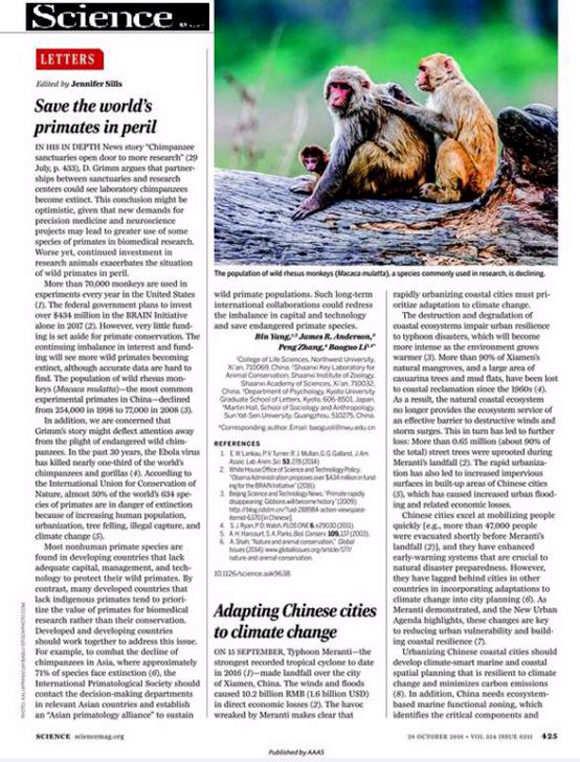Prof. Zhang Peng of SYSU’s School of Sociology and Anthropology published a co-author article in Science, highlighting for the conservation of non-human primates
Source: School of Sociology and Anthropology
Written by: School of Sociology and Anthropology
Edited by: Wang Dongmei
On October 28th, 2016, in the latest issue of
Science, Prof. Zhang Peng from the Primate Research Group of Sun Yat-sen University (SYSU) and Prof. Li Baoguo team from Northwest University in China published an article entitled "
Save the world’s primates in peril”, which pointed out that international acts like Brain Project and Precision Medicine Initiative, etc emerging in recent years already put primates in danger and make the situation even worse. Abundant primates were applied to scientific experiments, more than 70,000 monkeys were called for medical and neurologic research annually. In China, macaques as the most commonly used experimental primates have dropped from about 250 thousand (1998) to 70 thousand (2008). At present, primates are mainly distributed in developing countries in Africa, Southeast Asia and South America that lack sufficient technology, capital and management. It is difficult to protect indigenous primates effectively and properly. 50% out of 654 species of primates in the whole world are being endangered due to artificial interference, climate change, etc. The article appealing to every country to make international cooperation, to conquer the obstacles in capital management and technique, and to establish a long-term mechanism jointly for protecting our closest mammal.

To push it forward, the Primate Research Group of Sun Yat-sen University (homepage link http://primates.sysu.edu.cn/) proposed cross-disciplinary methods, such as social network analysis and the graph theory in the field of sociology, to study primate social stability mechanism. Their studies reveal the dynamic of primates’ social networks at individual, group and population levels, and also provide new theories for the primate conservation and social ecology. “Social networks dynamic revealed by temporal analysis” as title of this article was published in
American Journal of Primatology (SCI Q1). The first author of this article, Sebastian Sosa is associate researcher of Sun Yat-sen University and Prof. Zhang Peng is the corresponding author.
Reproduction is a key event in primate conservation. Reproductive assistance is not commonly found in wild primates as a characteristic of human beings. The primate research group of SYSU and Northwest University primate research team had a long-standing of inter-university cooperation. The first significant study that through effective teamwork, exposed the reproductive assistance behavior during Sichuan golden monkey’s delivery process. It not only helps to understand the origin of human reproductive assistance behavior, but also provides an important reference for the protection of endangered primates. The results came out as an article titled “Daytime birth and postbirth behavior of wild Rhinopithecus roxellana in the Qinling Mountains of China”, which was published in
Primates (Q2 SCI), with Prof. Zhang Peng as the co-first author, Sun Yat-sen University and Shaanxi Institute of Zoology as the co-first affiliations.
After the publication of this study, it has attracted extensive attention from international news media and science and technology news websites. International well-known news media reported, including
BBC-Earth, Daily Mail, IFLScience, National Geographic Channel (Natgeotv) and
AOL Huffington Post, have reported this study.
The series of studies has promoted public awareness of primate conservation in China, and also increased the international impact of the primate research group of SYSU. The research is supported by the National Natural Science Foundation of China.
